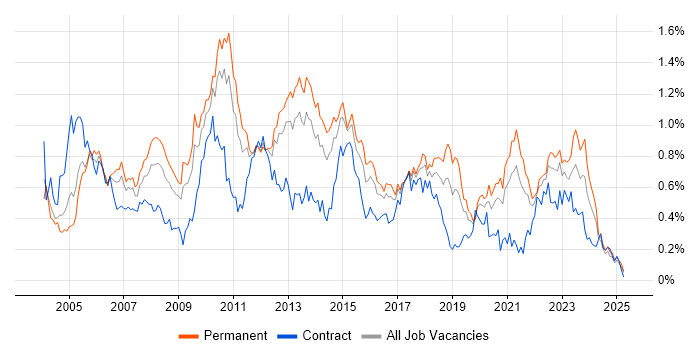Clustering
England > Midlands
The table below looks at the prevalence of the term Clustering in permanent job vacancies in the Midlands. Included is a benchmarking guide to the salaries offered in vacancies that cited Clustering over the 6 months leading up to 2 May 2025, comparing them to the same period in the previous two years.
| 6 months to 2 May 2025 |
Same period 2024 | Same period 2023 | |
|---|---|---|---|
| Rank | 243 | 251 | 252 |
| Rank change year-on-year | +8 | +1 | +64 |
| Permanent jobs citing Clustering | 9 | 65 | 72 |
| As % of all permanent jobs advertised in the Midlands | 0.13% | 0.56% | 0.75% |
| As % of the Miscellaneous category | 0.44% | 1.69% | 1.70% |
| Number of salaries quoted | 7 | 60 | 40 |
| 10th Percentile | - | - | £32,500 |
| 25th Percentile | £37,500 | £31,250 | £45,000 |
| Median annual salary (50th Percentile) | £45,147 | £42,500 | £55,000 |
| Median % change year-on-year | +6.23% | -22.73% | +22.22% |
| 75th Percentile | £57,500 | £53,750 | £62,875 |
| 90th Percentile | £58,300 | £55,500 | £65,000 |
| England median annual salary | £57,500 | £57,000 | £55,000 |
| % change year-on-year | +0.88% | +3.64% | +4.76% |
All Generic Skills
Midlands
Clustering falls under the General and Transferable Skills category. For comparison with the information above, the following table provides summary statistics for all permanent job vacancies requiring generic IT skills in the Midlands.
| Permanent vacancies with a requirement for generic IT skills | 2,031 | 3,855 | 4,241 |
| As % of all permanent jobs advertised in the Midlands | 29.29% | 32.99% | 44.27% |
| Number of salaries quoted | 1,079 | 2,655 | 1,500 |
| 10th Percentile | £27,250 | £25,750 | £31,250 |
| 25th Percentile | £35,000 | £33,563 | £41,250 |
| Median annual salary (50th Percentile) | £48,000 | £49,500 | £53,500 |
| Median % change year-on-year | -3.03% | -7.48% | +12.63% |
| 75th Percentile | £62,500 | £61,250 | £67,500 |
| 90th Percentile | £73,750 | £73,750 | £81,250 |
| England median annual salary | £60,000 | £55,000 | £65,000 |
| % change year-on-year | +9.09% | -15.38% | +4.00% |
Clustering
Job Vacancy Trend in the Midlands
Job postings citing Clustering as a proportion of all IT jobs advertised in the Midlands.

Clustering
Salary Trend in the Midlands
3-month moving average salary quoted in jobs citing Clustering in the Midlands.
Clustering
Salary Histogram in the Midlands
Salary distribution for jobs citing Clustering in the Midlands over the 6 months to 2 May 2025.
Clustering
Job Locations in the Midlands
The table below looks at the demand and provides a guide to the median salaries quoted in IT jobs citing Clustering within the Midlands region over the 6 months to 2 May 2025. The 'Rank Change' column provides an indication of the change in demand within each location based on the same 6 month period last year.
| Location | Rank Change on Same Period Last Year |
Matching Permanent IT Job Ads |
Median Salary Past 6 Months |
Median Salary % Change on Same Period Last Year |
Live Jobs |
|---|---|---|---|---|---|
| East Midlands | +47 | 6 | £47,500 | +8.57% | |
| West Midlands | 0 | 3 | £45,147 | +6.23% | 6 |
| Clustering England |
|||||
Clustering
Co-occurring Skills and Capabilities in the Midlands by Category
The follow tables expand on the table above by listing co-occurrences grouped by category. The same employment type, locality and period is covered with up to 20 co-occurrences shown in each of the following categories:
